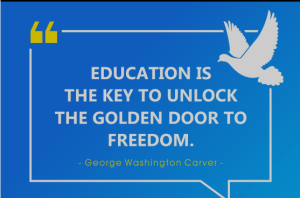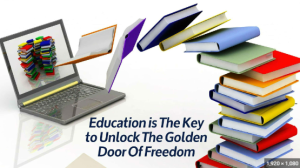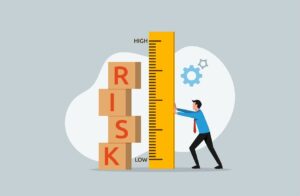Education: The Key to Unlock the Golden Door of Freedom
- Introduction
- Defining education
- Significance of education in society
- Education and Empowerment
- Empowering individuals through knowledge
- Education as a tool for social mobility
- Education and Economic Freedom
- Impact of education on economic opportunities
- Breaking the cycle of poverty through education
- Education and Critical Thinking
- Fostering critical thinking skills
- Promoting informed decision-making

- Education and Personal Development
- Enhancing personal growth and self-awareness
- Building character and resilience through education
- Education and Social Justice
- Addressing inequalities through education
- Promoting inclusivity and diversity in education systems
- Challenges in Access to Education
- Barriers to education worldwide
- Efforts to overcome educational disparities
- The Role of Technology in Education
- Advancements in educational technology
- Bridging gaps in access to education through technology
- Education for Sustainable Development
- Educating for environmental awareness and sustainability
- Integrating sustainable practices into educational curricula
- Education and Global Citizenship
- Fostering understanding and cooperation among nations
- Promoting peace and global solidarity through education
- The Future of Education
- Trends in education innovation
- Adapting education to the needs of the future
- Conclusion
- Recap of the importance of education
- Encouragement for continued support of education initiatives
Education: The Key to Unlock the Golden Door of Freedom
Education stands as the cornerstone of human progress, serving as the key that unlocks the golden door of freedom. It transcends mere classroom instruction, encompassing a journey of enlightenment, empowerment, and emancipation. In a world where knowledge is power, education emerges as the catalyst for societal transformation, offering individuals the means to shape their destinies and realize their fullest potential.
Empowering Individuals Through Knowledge
At its core, education empowers individuals by equipping them with the tools they need to navigate the complexities of the modern world. Beyond the acquisition of academic knowledge, education cultivates critical thinking skills, fosters creativity, and instills a lifelong thirst for learning. By providing individuals with access to information and resources, education enables them to make informed decisions, challenge prevailing narratives, and advocate for change.
Education as a Tool for Social Mobility
Education serves as a powerful agent of social mobility, offering individuals from diverse backgrounds the opportunity to transcend barriers and achieve upward mobility. Through education, individuals can break free from the constraints of poverty, discrimination, and inequality, opening doors to a brighter future and expanding their horizons. By investing in education, societies can create pathways for social advancement, driving economic growth, and fostering greater social cohesion.
Impact of Education on Economic Opportunities
The link between education and economic freedom is undeniable, with education serving as a catalyst for economic development and prosperity. Educated individuals are better positioned to secure meaningful employment, command higher wages, and contribute to the growth of their communities. Moreover, education equips individuals with the skills and knowledge needed to adapt to evolving job markets, driving innovation and entrepreneurship.
Breaking the Cycle of Poverty Through Education
Education has the power to break the cycle of poverty, offering marginalized communities a pathway to a brighter future. By providing access to quality education, societies can empower individuals to lift themselves out of poverty, creating a ripple effect that extends across generations. Through targeted interventions and investment in education infrastructure, governments can address systemic inequalities and ensure that every individual has the opportunity to thrive.
Fostering Critical Thinking Skills
In an era of misinformation and fake news, education plays a vital role in fostering critical thinking skills and media literacy. By teaching individuals to question, analyze, and evaluate information critically, education empowers them to discern fact from fiction and make informed decisions. In an increasingly interconnected world, where information is readily accessible, critical thinking skills are essential for navigating complex issues and engaging in meaningful dialogue.
Promoting Informed Decision-Making
Education is instrumental in promoting informed decision-making across various domains, including healthcare, politics, and finance. By providing individuals with access to accurate information and resources, education enables them to make decisions that align with their values and priorities. Whether choosing a career path, voting in elections, or managing personal finances, educated individuals are better equipped to navigate life’s challenges and seize opportunities.
Enhancing Personal Growth and Self-Awareness
Education is not merely about acquiring knowledge but also about fostering personal growth and self-awareness. Through education, individuals have the opportunity to explore their interests, develop their talents, and cultivate a sense of purpose. Education encourages individuals to reflect on their values, beliefs, and aspirations, empowering them to lead fulfilling lives and make meaningful contributions to society.
Building Character and Resilience Through Education
Education instills values such as perseverance, resilience, and empathy, shaping individuals into responsible and compassionate members of society. By exposing individuals to diverse perspectives and experiences, education fosters empathy and understanding, bridging divides and promoting social cohesion. Moreover, education equips individuals with the skills and mindset needed to navigate life’s challenges with grace and resilience.
Addressing Inequalities Through Education
Despite its transformative potential, access to quality education remains a privilege rather than a right for millions of individuals worldwide. Economic disparities, gender inequality, and systemic barriers continue to hinder access to education, perpetuating cycles of poverty and marginalization. Addressing these inequalities requires a concerted effort from governments, policymakers, and civil society to ensure that education is accessible, inclusive, and equitable for all.
Promoting Inclusivity and Diversity in Education Systems
Diversity and inclusivity are essential pillars of a robust education system, ensuring that all individuals have the opportunity to learn and thrive. By embracing diverse perspectives, cultures, and experiences, education promotes tolerance, understanding, and respect for differences. Moreover, inclusive education environments create opportunities for collaboration, innovation, and creativity, enriching the learning experience for all students.
Barriers to Education Worldwide
Despite progress in expanding access to education, numerous barriers persist, hindering millions of individuals from realizing their right to education. Poverty, conflict, displacement, and discrimination are among the myriad factors that impede access to education, particularly for vulnerable populations such as girls, refugees, and children with disabilities. Addressing these barriers requires targeted interventions, including investments in education infrastructure, teacher training, and community outreach.
Efforts to Overcome Educational Disparities
Efforts to overcome educational disparities require a multifaceted approach that addresses both systemic barriers and individual needs. Governments must prioritize education spending, allocate resources equitably, and implement policies that promote inclusive and accessible education for all. Moreover, partnerships between governments, NGOs, and the private sector can leverage collective expertise and resources to expand educational opportunities and bridge gaps in access.
Advancements in Educational Technology
Advancements in educational technology have revolutionized the way we teach and learn, offering new opportunities for access, engagement, and personalized learning. From online courses and digital textbooks to interactive simulations and virtual reality experiences, technology has the potential to democratize education and reach learners in





